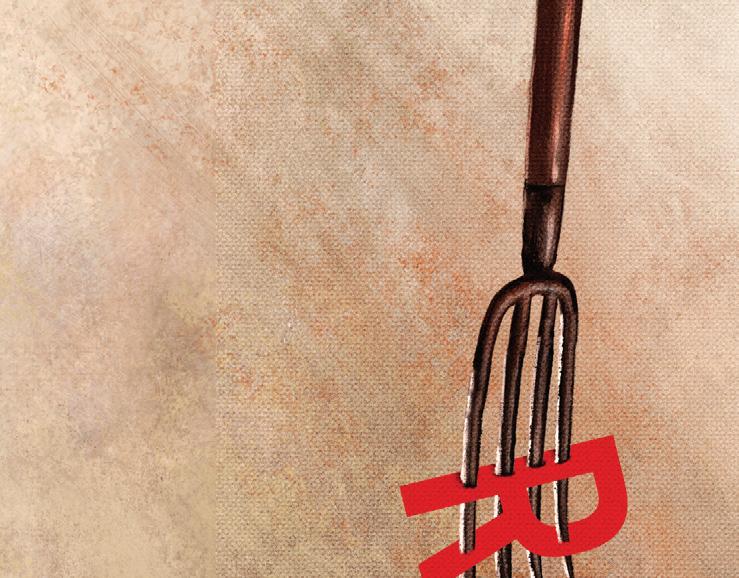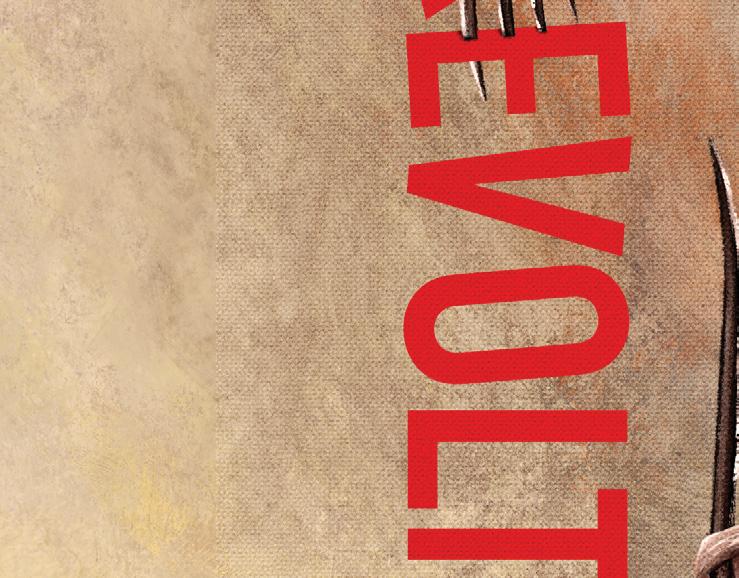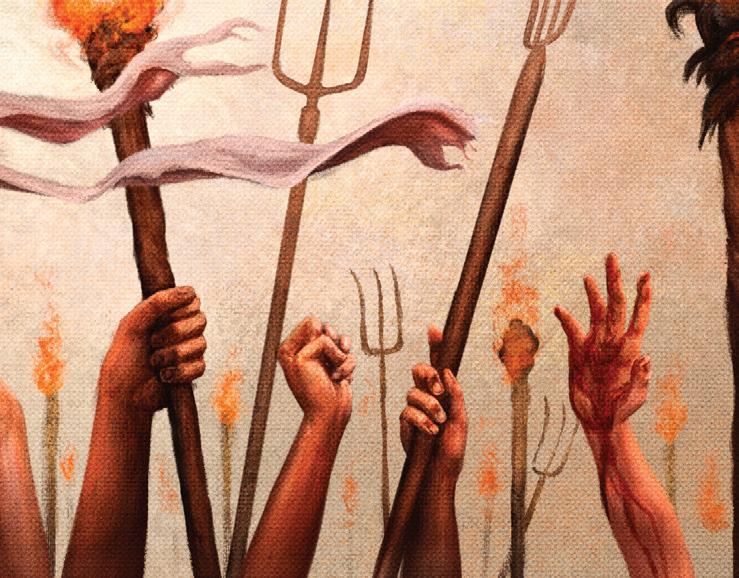
















‘History’s
greatest ally.’ DAN SCHREIBER









Also by Terry Deary
A riotous history of rebellions and revolutions
UK | USA | Canada | Ireland | Australia India | New Zealand | South Africa
Transworld is part of the Penguin Random House group of companies whose addresses can be found at global.penguinrandomhouse.com.
Penguin Random House UK, One Embassy Gardens, 8 Viaduct Gardens, London SW11 7BW
penguin.co.uk
First published in Great Britain in 2025 by Bantam an imprint of Transworld Publishers
Copyright © Terry Deary 2025
The moral right of the author has been asserted.
Every effort has been made to obtain the necessary permissions with reference to copyright material, both illustrative and quoted. We apologize for any omissions in this respect and will be pleased to make the appropriate acknowledgements in any future edition.
Penguin Random House values and supports copyright. Copyright fuels creativity, encourages diverse voices, promotes freedom of expression and supports a vibrant culture. Thank you for purchasing an authorized edition of this book and for respecting intellectual property laws by not reproducing, scanning or distributing any part of it by any means without permission. You are supporting authors and enabling Penguin Random House to continue to publish books for everyone. No part of this book may be used or reproduced in any manner for the purpose of training artificial intelligence technologies or systems. In accordance with Article 4(3) of the DSM Directive 2019/790, Penguin Random House expressly reserves this work from the text and data mining exception.
Text design by Couper Street Type Co.
Typeset in 12.5/17pt Adobe Jenson Pro by Six Red Marbles UK, Thetford, Norfolk Printed and bound in Great Britain by Clays Ltd, Elcograf S.p.A.
The authorized representative in the EEA is Penguin Random House Ireland, Morrison Chambers, 32 Nassau Street, Dublin D02 YH68.
A CIP catalogue record for this book is available from the British Library.
ISBNs:
9780857507600 (cased) 9780857508645 (tpb)
Penguin Random House is committed to a sustainable future for our business, our readers and our planet. This book is made from Forest Stewardship Council® certified paper.
This book is dedicated to the true heroes of history, Mr and Mrs Peasant
‘Disobedience, in the eyes of anyone who has read history, is man’s original virtue. It is through disobedience that progress has been made, through disobedience and through rebellion.’
Oscar Wilde, ‘The Soul of Man Under Socialism’, 1891
How revolting are you? It’s something you ought to ask yourself. You may swear you are the least revolting person you know but are you really? Don’t you take the side of the rebel? Don’t you cheer for Robin Hood rather than the Sheriff of Nottingham? Don’t you quietly suppress a sigh when revolting peasant Wat Tyler is stabbed by the weedy Richard II ’s henchman? Or wipe away a tear for Joan of Arc as her dreams of freedom go up in smoke (along with her body)?
We need to understand our fellow humans, but first we need to understand ourselves. One of the many measures of your personality is where you stand on rebellion: are you a conformist or ready to take arms against a sea of troubles?* If you think you are a conformist, are you sure there’s nothing that would make your rebel spirit spring out from under the duvet?
You have plenty of material out there. The history of the world is a history of rebellion, from Day One up until today and probably long into the future.
Ashurbanipal, the last great king of the Assyrian Empire, was
* Good phrase. Note to self: use it in a playscript some time.
not a man to be trifled with. In 667 bc he invaded Egypt to finish off what his dead granddad Sennacherib had started.
Sennacherib (ruled 705–681 bc) had promised those who resisted his rule . . .
I cut my enemy’s throats like lambs. I cut off their precious lives like string. Like the waters of a storm, I make the juices of their throats and guts run down onto the wide earth. My prancing horses plunge into the streams of their blood as they would into a river. The bodies of their warriors filled the plain. I tore out their private parts like the seeds of cucumbers.
You may be fined for refusing to pay your television licence but at least you get to keep your private parts. (Probably.) When it was Ashurbanipal’s turn to repress Egypt, many of the Egyptian nobility were executed and the Assyrians ruled for twenty painful years. Like his granddad – it must run in the family – Ashurbanipal was a cruel ruler who had his promise carved onto a monument . . .
I had the arms and legs cut off their bodies and I fed them to the dogs, pigs, wolves and eagles. I fed them to the birds in the heavens and the fish in the oceans. What was left I had taken from Babylon and thrown into heaps. I broke into the tombs of the old Elamite kings and let in the sun. I carried their bones back to Assyria. I stopped the priests giving them sacrifices so their ghosts were tormented.
As deterrents against insubordination go, that is stronger than detention at HMP.
It seems rebellion is just part of our nature. In the Bible, God tells Adam and Eve they may eat any of the fruit in the Garden of Eden but not the apple. So, what did they do? You know it. An evil serpent persuades them to have a nibble. As a punishment, we humans were thrown out of Eden and left to hunt and gather for ourselves. ‘That’ll teach them to rebel,’ God said. She already had her own problems with Lucifer – a rebel angel. God’s answer to Lucifer’s disobedience was to order him to get the hell out of heaven. Not God’s smartest move: the exiled can still plot and organize a comeback. Still, defying authority has consequences. Rebel if you want, but face punishment if you fail (especially if you live in ancient Assyria).
If you’re not persuaded by lessons from the Bible, then look at the Greek cautionary tales. Prometheus rather liked the primitive little humans. Zeus told Prometheus not to give the pathetic primates the gift of fire. Prometheus disobeyed, which is just as well otherwise a lot of us would still be shivering while eating raw mammoth. Unfortunately for Prometheus, Zeus chained him to a rock on Mount Caucasus. Every day, an eagle would claw its way into his side to nosh on his liver (no onions). That liver would regenerate overnight, and the torment would start all over again. Prometheus suffered this torture for centuries until, eventually, Hercules freed him by slaughtering the eagle and breaking the fire-thief’s chains.
You may notice another salutary lesson in there. The poor old eagle was only doing its job. Those people who, through history, have carried out the punishments – the hangmen and the jailers, the assassins and the law enforcers – are on the front line when rebels strike back. When the Peasants’ Revolt kicked off in
1381, the cry was, ‘Kill the lawyers!’ But it was Sergeant-at-Arms John Legge at the Tower of London who stood in the way of the rebels and was butchered. He wasn’t a lawyer trying to enforce the unpopular Poll Tax. Legge wasn’t even a solicitor. He was just in the way.
The Peasants’ Revolt happened because King Richard II had needed the Poll Tax to fight the Hundred Years’ War over in France and expand his power. Richard II was not killed. Sergeant-at-Arms Legge was. Had the war gone ahead, Richard would have employed some of those revolting peasants as infantry to fight and die for his ambitions. The peasants were being asked to pay a tax for the privilege of risking their lives in a battle that didn’t benefit them. Meanwhile Richard would have stayed safe by the fireside at home (thanks, Prometheus). You can understand why the peasants were miffed and resorted to cutting off the heads of the powerful and fastening them on poles.*
Many people through history have claimed that violence is never the answer. Really clever people like Mahatma Gandhi (1869–1948) who said, ‘Victory attained by violence is tantamount to a defeat, for it is momentary.’ Momentary or not, three bullets fired into the chest of Gandhi by Nathuram Godse put a permanent end to the pacifist.
It’s tempting to ask what Gandhi’s views would have been on the events of 20 July 1944, when Claus von Stauffenberg led the plot to assassinate Adolf Hitler. He took a briefcase packed with
* Presumably they secured the heads using pole tacks.
explosives into a meeting with the Führer. The bomb was placed next to Hitler, but an aide called Heinz Brandt moved it unknowingly to one side. When it exploded, one of the table legs shielded its target from the blast and the Charlie Chaplin lookalike escaped with scorched trousers. (Brandt was killed and it’s hard to resist saying, ‘Serves you right’.) Almost five thousand people were arrested and executed in revenge. The Second World War would be over the next year, but in that year an estimated 60 to 80 million people lost their lives, including a staggering 55 million civilians. All those millions died because a single act of violent rebellion failed.
Not many events in the history of revolt are on as dramatic a scale as that plot. Most people will say the assassination attempt on Hitler was the right thing to do. A huge majority of Americans would argue that the assassination of Abraham Lincoln is at the ‘wrong’ end of the spectrum. (There will always be a lunatic fringe who argue that Lincoln’s assassination was ‘right’, but we can ignore them because they are lunatics.) The problem is that very few rebellions are as clear cut as those examples, and they probably won’t be when you make your own choices in the future, even if you are armed only with a pencil in the ballot box. How far would you go to fight an injustice? Simply put, there are three stages:
Riot: a public act of violence by an unruly mob, which sometimes leads to . . .
Rebellion: open opposition to authority. Rebellions are usually unsuccessful. Because if they succeed they become a . . .
Revolution: the overthrow of rulers by the ruled.
When rebels win the language shifts. ‘Rebels’ become ‘freedom fighters’. As Napoleon said, ‘When the mob gains the day, it ceases to be the mob. It is the nation.’
What would turn your grumbling into open rebellion? What would persuade you to stop grumbling and act? If failure meant you faced ruin, torture, death or disembowelment, is there anything that would motivate you to act against the status quo? What revolting situation could strike a rebellious chord in you?
The world is waiting on your answer.
‘Poverty is the parent of revolution and crime.’ Aristotle (384– 322 bc) – Greek philosopher
People rebel because they hope that if they win they will be better off. And that has sometimes meant better off financially. In the words of the sainted Tom Cruise in the movie Jerry Maguire, our rebels may scream, ‘Show me the money.’
Taxes have always been a source of discontent. It’s not the principle – you pay a share of what you have, and the community gets a benefit. No, it’s the inequity of forking out when those richer than you don’t, or it’s the way your taxes are spent. You love the roads your taxes went to pay for but the un-mended potholes drive you to distraction . . . or rather they stop you driving to distraction – or anywhere else – because your cart has broken a wheel.
Then there are those who want something they think is rightfully theirs, but have it purloined by the powerful. A revolt will reclaim your inheritance. If it doesn’t get you killed of course.
Marcus Licinius Crassus, 115–53 bc
Crassus ruled the empire alongside Julius Caesar. He set up schools for slaves and educated them to a high standard. What a humanitarian, you cry? No. He had an ulterior motive. He ensured his trained slaves were given jobs with the most influential Romans. There they could spy on their new owners and report their secrets to Crassus. Those secrets made him rich and also helped keep him safe from his enemies. He became known as the richest man in Rome thanks to a career primed by his daddy’s millions. (Any resemblance to a US president is simply coincidence.) He used his wealth to buy his way into power and succeeded.
He had been exiled in Spain from 87–84 bc but used his money to finance a private army of 2,500 men. They in turn multiplied his investment by bullying and plundering cities in the region. He then joined with the rebel Sulla to march on Rome and take over. A successful revolution had begun. The trick was to hang on to that power. Money would be needed to bribe, appease and mollify opposition. The great thing about being in power is you can generate money. Crassus set about amassing a fortune in a way that Scrooge would have approved of if he had been invented 1,900 years earlier.
Sulla punished his enemies by confiscating their property and selling it off cheaply. First in the queue with his toga full of sesterces was Crassus. His property dealings, along with a lot of slave trading, meant his wealth grew to around 200 million sesterces. (In modern money, that is a lot.)
For those who wish to become multi-millionaires, here is a
tip. Find a burnt- out house and buy it cheap from the desperate (uninsured) owner. Rebuild it even cheaper – using the enslaved labourers that you own – and end up owning a large part of Rome.
You may like to imitate Crassus’s even more evil trick, if you are so inclined: set up your own fire brigade. Rush to the scene of a fire but refuse to put it out until the owner agrees to sell for a knock- down (or burnt- down) price. After your bargainbasement brickies have rebuilt it you may generously let the poor owner rent it back. Hod luck, mate.
Crassus’s rise looked unstoppable. Not even a scandal of criminal intimacy with a woman could stop him. (Any resemblance etc.) The woman in question was a vestal virgin, and purity was in her job description. Any man found guilty of violating her sacred condition would be publicly beaten to death. Crassus was sent for trial. His defence? Crassus said, ‘I was not interested in her body, just her villa.’
That would be a laughable defence if you or I made it. But Crassus was so notorious for his avarice the judge believed him and Crassus was acquitted. (To answer your unspoken question, yes, he got the villa too.)
His rise to political power had one major problem: the general and statesman Pompey the Great (106–48 bc). The politically popular Pompey kept winning wars and that made him a hit with the Roman people, from plebs to patricians.
Then there was the problem of facing down a slave revolt. After all, it was fine for Crassus to approve of revolt as a means to snatching power, but once he had power he suddenly executed a volte-face. He loathed servile insurgence. Crassus enlisted
his own army to fight the rampant rebels. One small setback occurred when, faced with a skilled enemy, a part of the Roman army threw down their weapons and fled. Crassus reverted to the ancient Roman practice of decimation – one man in ten executed by the other nine. (The lucky executee was chosen by lot. This was one lottery you did not want to win.)
The brutality worked. Spartacus and his slave army were dangerous, but you had a chance; Crassus was deadlier, and a lost lotto was life- ending.
The revitalized army defeated the slave rebellion of Spartacus in 71 bc. It’s said that Spartacus fought his way towards Crassus and slew the two centurions guarding the richest Roman but failed and died in the battle. It ought to have brought the acclaim that Crassus craved. But his great rival, Pompey, mopped up the fugitive slaves and got the greatest reception back in Rome – a triumphal ride into the city. Crassus could have had a sort of runners-up medal – an ‘ovation’ or a triumphal walk into Rome – but took a huff and said he (unlike Pompey) didn’t want recognition for beating a bunch of slaves.
Pompey was known as ‘The Great’. Crassus sneered, ‘Why, how big is he?’ (You may assume he was referring to Pompey’s private parts? Shame on you.)
Crassus needed an even greater victory to satisfy his vanity. He spent yet more of his wealth on raising a new private army and set off to the east to pick a fight with the Parthians. He was rich in sesterces but poor in brain cells. His campaign would involve Rome in a conflict that would last for 250 years.
Like many truly rich people he came to believe in his own infallibility – the arrogant belief that he knew better than the rest
of us. As well as the household spies, he had hired military moles to report on the enemy, which was a sensible move. But then he didn’t take heed of his henchmen. Imagine their frustration. His agents said the Parthians used horse archers whose speed would overwhelm the legionaries in their standard Roman formation. Crassus ignored their counsel.
He listened instead to a treacherous client king who advised him to lead his heavy infantry through a desert, far from a water supply. As his spies had predicted, the light, mounted Parthians inflicted huge damage on the Romans. Crassus retreated and left around four thousand of his wounded to burn in the sun or be slaughtered by the enemy.
Now it was the turn of the surviving Roman troops to rebel and insist that Crassus negotiate with the Parthian general. On their way to the truce meeting, one of Crassus’s junior officers panicked when he suspected treachery. He initiated a fight in which all the Romans – including Crassus – were slaughtered. The richest Roman was decapitated.
The Parthians, with a less-than-subtle sense of irony, opened Crassus’s mouth and poured in molten gold: a symbolic punishment for the man’s greed. ‘You like riches? Drink your fill’.
The Roman statesman Seneca (5 bc–ad 65) said, ‘For greed all nature is too little.’
And Seneca was around at the time of the Roman invasion of Britain by Claudius in ad 43. Of course, there are several reasons advanced as to why the Romans chose to occupy a damp patch
on the edge of the map: power and glory, trade and security. But, silver, gold, lead and iron were an equally good reason. The Roman rulers loved wealth and invading Britain was a commercial enterprise. They put in cash to raise armies and transport, weapons, and infrastructure. They expected a considerable return on their investment.
The other ‘cost’ of the expedition would be paid in the blood – obviously they projected more native blood than Roman blood but that would be the fault of the natives. They should simply meekly accept the Roman hegemony, allow themselves to serve the empire and avoid bloodshed.
The Romans were greedy, yet they didn’t seem to anticipate their victims could be driven by that same deadly sin. It was greed that aroused wrath in the Iceni tribe of East Anglia to shed buckets of Roman blood and (ultimately) British blood. By ad 61 Nero had taken the imperial reins. If we are to believe his biographers, Nero was the master of murder and madness. Seneca (who warned us about ‘greed’) had been teenage Nero’s tutor then imperial advisor when Nero took the throne. Did this generate a bond between the two? Apparently not. Nero forced Seneca to kill himself. Seneca was implicated, probably falsely, in a plot to assassinate the emperor. Nero ordered him to take his own life. This teacher’s-pet-turned-persecutor was the man the British tribes had to accept as their overlord. Many tribes did and paid tribute to him. Nero raised taxes to pay for his extravagant lifestyle – the family funerals that Nero occasioned must have cost a fortune. Yet it was a relatively trivial bit of avarice that led to an outpouring of blood in the revolt of ad 61.
Boudica was queen of the Iceni tribe in East Anglia. She was
not a woman to be trifled with. Roman historian Dio Cassius (ad 150–235) said . . .
She was huge and terrifying with a harsh voice. A great mass of bright red hair fell to her knees: she wore a twisted necklace, and a tunic of many colours, over which was a thick cloak, fastened by a brooch. Now she grasped a spear, to strike fear into all who watched her.
You will notice that Cassius was writing long after the rebellion and Boudica’s subsequent disappearance. It’s fair to assume that regardless of this fanciful description of her appearance she was a forceful woman. Yet she and her husband, Prasutagus, had submitted to Roman rule, to their mutual benefit. That benefit included access to Roman loans to improve their quality of life. Prasutagus assumed that when he died the loans would be annulled. And why not? He saw the ‘loan’ as a bribe. Rome was paying for Iceni collaboration. Nero would have profited from a harmonious peace. Yet instead, the loan provoked disharmony and rebellion. Why? Because Nero’s greed overrode his common sense.
When Prasutagus died he did a clever-stupid thing and left a Roman will. This will left the Iceni lands and wealth divided between his Iceni daughters and Emperor Nero. It was clever because it aimed to secure the inheritance for his family. It was also stupid because the Romans saw it as a white flag of weakness. Maybe Nero was influenced by the Roman orator Cicero (106–43 bc), who confidently explained that women have ‘a weaker intellect’ than men.
Nero must have smiled from coiffed locks to coiffed socks and said he would take it all. This was another clever-stupid action. Clever because it enriched and paid his hairdresser’s bills. Stupid because he hadn’t done a risk-assessment and asked, ‘What would be the consequences of my actions?’
The Roman officials in Britain called in the loans, a move that would have bankrupted Boudica and her tribe. Historian Tacitus (ad 56–c. 120) said that when Boudica and her daughters failed to pay up, the officials had them flogged and raped. Dio Cassius simply said the Roman financiers were to blame for the Iceni reaction. To the Romans a rape was an offence against a woman’s ‘guardian’ (hubby or dad) but not against her personally. Boudica and the Iceni took a different view. And their reaction was violent and bloody.
Big Bad Boud and her allies attacked the Roman settlement at Colchester first, massacred the garrison there and turned towards London.
The Londoners were left to the mercy of Boudica’s rebels.
London was a trading port at that time, not a Roman military settlement. Not every Briton hated the Romans. A lot of yuppies were rather taken by the Roman lifestyle and Boudica didn’t get a tidal wave of support from south of the Thames. Maybe torching the city was her way of making her point to the southern folk. Maybe she wanted to destroy the bridge across the Thames to protect her rear when she turned north to pursue the Roman general Paulinus? Whatever her motive, the outcome was straightforward: London’s burning.
It’s said that around seventy thousand Romans and their
sympathizers died . . . but again these are Roman estimates, and they had their own reasons for inflating the figures.
The ending was sadly predictable. The Romans finally managed to bring Boudica’s hundred thousand warriors to a set-piece battle, somewhere on Watling Street. The outnumbered but heroic Romans (Roman version) faced the wild British barbarian hordes.
Tacitus claimed Boudica made a grand last speech. She said she wasn’t a queen fighting for her lost wealth but a Briton fighting for the freedom of her people and that God was on their side. She said . . .
Heaven is on the side of a righteous revenge; one legion which dared to fight has already perished; the rest are hiding or are thinking of running away. They can’t resist even the war- cries of so many let alone our charge and our blows. We must win this battle or die. Let the men live as slaves if they want to. I won’t.
And of course she didn’t live as a slave. Her army faced ten thousand Romans under Paulinus.
Paulinus’s speech to the troops was more practical. According to Tacitus he said . . .
Ignore the noise made by these savages. There are more women than men in their ranks. They aren’t soldiers – they’re not even properly armed. We’ve beaten them before and, when they see our weapons and feel our spirit, they’ll crack.
Bring them down with your javelins and finish them off with your swords.
The Roman army dutifully obeyed. Paulinus chose a narrow battlefield (somewhere in the Midlands) so the Brits couldn’t use their numerical advantage. The Romans used a wedge formation to drive the Britons back to where their own families and followers had formed an arc of supply wagons. The trapped tribes were slaughtered: eighty thousand of them died to only four hundred Romans. Result.
Boudica is then lost to history. Paulinus exacted revenge. His massacres probably killed more than Boudica had done. His diligence in killing off all opposition led to him being relieved of his command by Nero and recalled to Rome under a cloud. Nero’s illogical response was, ‘Thanks, Paulinus, let’s reward you with a slapped wrist.’
Nero had half a dozen years to ruminate on his decision to rob Boudica. He was condemned to death by the senate and took his own life just as he had ordered his old teacher Seneca to do. Neat.
Countless thousands died in the revolt of the Iceni because Nero wanted Boudica’s piddling half of a native tribe’s wealth. Greed.
The Battle of Hastings in 1066 was a seminal moment in British history, as you know. Or maybe you don’t know. A survey of a thousand British adults in 2024 revealed that a quarter couldn’t
name the year in which the Battle of Hastings was fought. If you ‘tut’ at them then you may be apoplectic to hear that 3 per cent believe it was won by Robin Hood and 2 per cent think it was won by Napoleon.*
So, for the avoidance of confusion, William the Conqueror led his Norman troops to victory over Harold II at the Battle of Hastings in 1066. Less familiar is the history of the aftermath and the story of the English who resented the Norman invasion and attempted to reverse it. Like Boudica, they are portrayed as freedom fighters struggling against the invaders. By the English Civil Wars of the 1640s the idea of a ‘ruling class’ had become known as ‘the Norman yoke’.
The original Saxon rebels who had survived the Battle of Hastings (in 1066, lest you forget) were fuelled by the loss of their comfy ruling- class lives. They had been dispossessed of land and property and wanted them back. This sounds more like selfinterest than a heroic and patriotic cry of ‘Let my people go.’
The regions in the south of England had lost more of their English lords at the Battle of Hastings than those further north. The leaderless southron folk surrendered more readily. After Hastings the Normans approached Winchester and the city rolled over faster than a barrel of wine on a ski slope. The monkish chronicler William of Malmesbury (c. 1095–1143) moaned that, after the Norman Conquest, England became a residence
* The ‘questions’ for the survey were compiled by ten-year- olds who DID know the answers. If you knew those facts then congratulations; you can be reassured you will do well in your Key Stage 2 SATs exams.
for foreigners and that there were no English earls. That wasn’t true, but William the Conqueror did redistribute the land extensively to his loyal Norman pals. That helped ensure the new king’s hold on the land, but it also helped line his pockets (if his chain-mail had pockets).
The Anglo- Saxon Chronicle took the Anglo-Saxon line in reporting the Norman depredations: ‘The king and the principal men greatly loved gold and silver and did not care how sinfully it was got as long as it came to them. The king granted his land on such hard terms, the hardest he could.’ The chronicle went on to say he offered estates to someone willing to offer an extortionate fee, but then ‘the king let it go to the man who offered him more. Then a third came and offered yet more, and the king let it go into the hands of the man who offered him most of all.’ He was just like Dickens’s Ebenezer Scrooge: ‘a squeezing, wrenching, grasping, scraping, clutching, covetous, old sinner’.
William’s reign started badly when coronation cheers from inside Westminster Abbey were interpreted by Norman guards outside as a Saxon rebellion. They responded by setting nearby buildings alight. The English spectators ran towards the blaze to courageously douse the flames or equally courageously loot the flaming buildings. The monk Orderic Vitalis (1075–c. 1142) said the whole episode had ‘the English believing there was a plot behind something so completely unlooked for, were extremely angry and afterwards held the Normans in suspicion, judging them treacherous’.
The dispossessed Saxons led rebellions but lacked the unity to succeed. The Normans held power with the help of collaborators and quislings. Who can blame them given the Conqueror’s